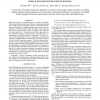Free Online Productivity Tools
i2Speak
i2Symbol
i2OCR
iTex2Img
iWeb2Print
iWeb2Shot
i2Type
iPdf2Split
iPdf2Merge
i2Bopomofo
i2Arabic
i2Style
i2Image
i2PDF
iLatex2Rtf
Sci2ools
101
click to vote
ICMCS
2010
IEEE
2010
IEEE
Speech emotion estimation in 3D space
Speech processing is an important aspect of affective computing. Most research in this direction has focused on classifying emotions into a small number of categories. However, numerical representations of emotions in a multi-dimensional space can be more appropriate to reflect the gradient nature of emotion expressions, and can be more convenient in the sense of dealing with a small set of emotion primitives. This paper presents three approaches (robust regression, support vector regression, and locally linear reconstruction) for emotion primitives estimation in 3D space (valence/activation/dominance), and two approaches (average fusion and locally weighted fusion) to fuse the three elementary estimators for better overall recognition accuracy. The three elementary estimators are diverse and complementary because they cover both linear and nonlinear models, and both global and local models. These five approaches are compared with the state-of-the-art estimator on the same spontaneo...
| Added | 07 Dec 2010 |
| Updated | 07 Dec 2010 |
| Type | Conference |
| Year | 2010 |
| Where | ICMCS |
| Authors | Dongrui Wu, Thomas D. Parsons, Emily Mower, Shrikanth Narayanan |
Comments (0)

